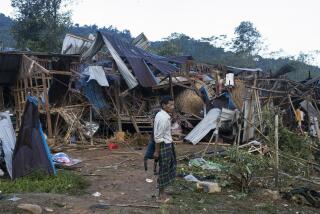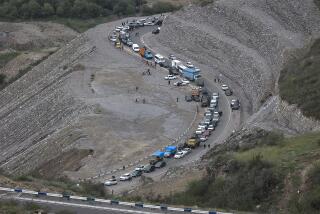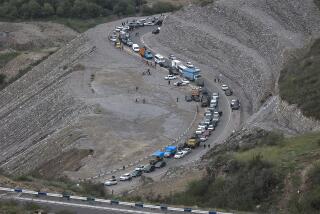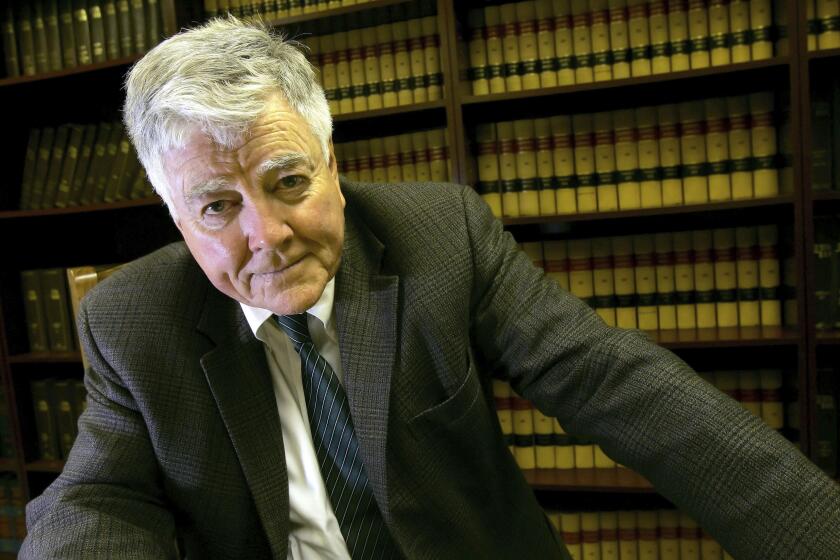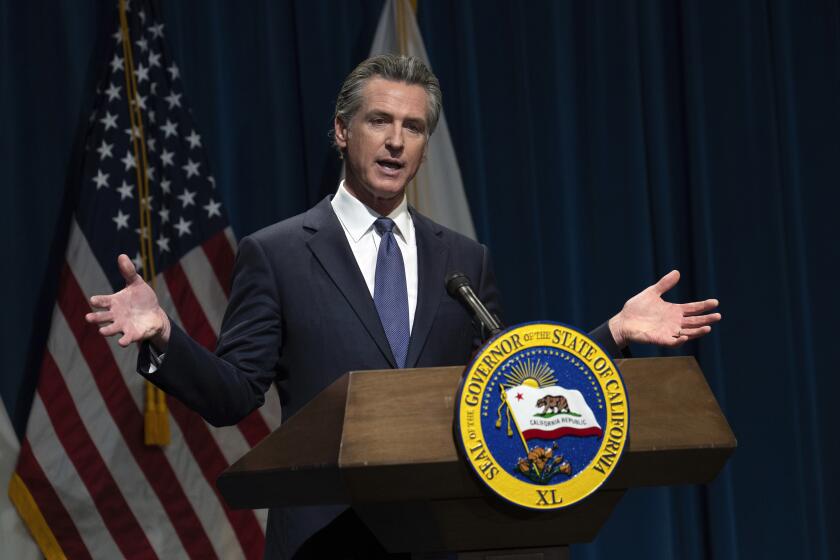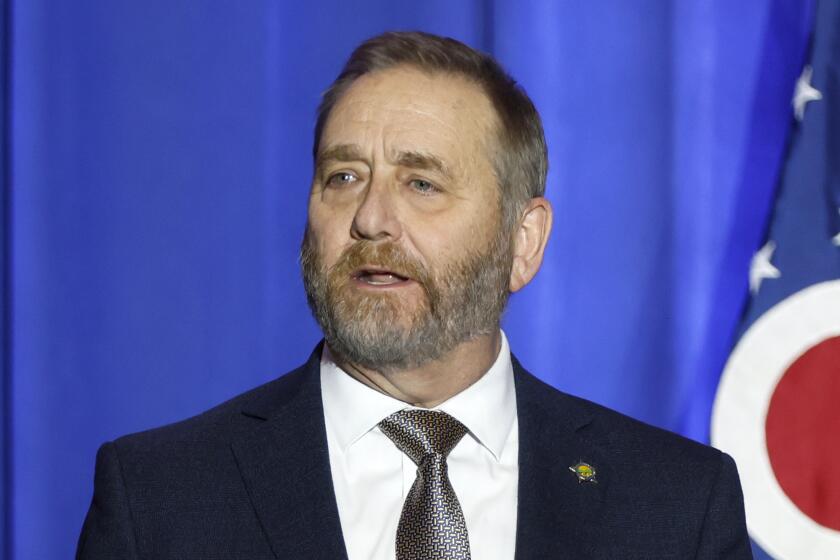For Some in Northern Alliance, Pact for New Government Falls Far Short
The landmark agreement to bring peace to Afghanistan came under attack Thursday from several old guard commanders of the Northern Alliance, which won the dominant share of power in an interim government.
Northern Alliance dissenters included Gen. Abdul Rashid Dostum, an Uzbek warlord in the northern city of Mazar-i-Sharif, commander Ismail Khan in the western city of Herat and at least two alliance leaders in Kabul, the capital.
The Iranian-backed Hezb-i-Wahdat Party, whose Shiite Muslim Hazara fighters waged fierce battles in the civil war for control of Kabul in the early 1990s, also expressed reservations about the deal signed Wednesday near Bonn.
However, facing intense pressure from foreign governments and the United Nations, the commanders appeared willing to try to resolve their differences.
Secretary of State Colin L. Powell called on all Afghan warlords to put aside rivalries and endorse the interim administration. “I am confident that the administration is representative of the Afghan people and aspects of Afghan society,” Powell said at a news conference at North Atlantic Treaty Organization headquarters in Brussels.
Francesc Vendrell, deputy to the chief U.N. mediator of the deal, said he did not believe that unhappiness among Northern Alliance commanders would block the scheduled Dec. 22 change of power in Kabul but that it might create problems in enforcing the agreement.
“An agreement signed with a certain amount of pressure and with so many warlords and forces on the ground could be difficult to implement,” Vendrell said.
At least one sidelined Northern Alliance official in Kabul said that despite the displeasure with the agreement, fighting is less likely in its aftermath because of international determination to bring peace to Afghanistan. Several agreements have failed during the nation’s 23 years of war.
Nevertheless, Wahidullah Sabawoon, 59, who was replaced as finance minister in the agreement, said he would insist that his Hezb-i-Islami party have a seat in the interim government.
“I think there shall be some changes and we will be given our rights,” said Sabawoon, who fought Soviet occupation in the 1980s. “We have been betrayed. Either me or any member of our party can be nominated for a ministry.”
Arguing over seats in the government is not so much a fight over the spoils of war as it is jockeying for position to benefit from an aid bonanza.
Foreign governments are preparing to spend $5 billion to $10 billion rebuilding Afghanistan during the next decade. Anyone who controls one of the ministries overseeing the huge donations stands to profit from inevitable corruption.
On the night of Nov. 12, when Taliban troops abandoned the capital ahead of advancing Northern Alliance troops, they looted the central bank vault. Thieves hauled off $5 million in U.S. currency, $1.5 million more in afghani and Pakistani rupee notes, and four cases of gold, Sabawoon said.
Only $95,000 in U.S. cash, and about $460,000 in afghanis and Pakistani rupees were left, he added.
In the talks in Germany, Sabawoon lost the Finance Ministry to Hedayat Amin Arsala, a supporter of the exiled monarch, Mohammad Zaher Shah.
Dostum, the most powerful warlord in northern Afghanistan, said he had been promised the post of foreign minister. He has been pressing his advantage since the Northern Alliance forced the Taliban out of northern Afghanistan.
He holds many Taliban prisoners, including some considered to be important Al Qaeda operatives sought by the United States. He has been acting increasingly statesmanlike in public, calling for the United Nations to mediate in deporting the foreign prisoners and setting up a war crimes tribunal for Taliban leaders.
Dostum said the conference failed to honor an agreement to give the three top posts in the new Cabinet to the alliance’s three main factions. His party was granted relatively minor posts.
“The strongest defeat of the Taliban was given by Dostum’s forces,” said Gen. Alim Razem, Dostum’s political advisor. “We bore many casualties. Many people lost their lives, and others were injured. But we endured, and now we have 5,000 POWs. Unfortunately, the final decision about the composition of the Cabinet did not match what had been promised.”
“We will continue to support the peace process in Afghanistan, but we prefer not to participate in the formation of the Cabinet in such a weak form,” Razem told reporters in Mazar-i-Sharif.
Instead of Dostum, longtime Northern Alliance Foreign Minister Abdullah held on to his post in the new administration.
Hezb-i-Wahdat, the Hazara faction, had argued that one of its members should head the interior ministry. Control of the ministry instead went to Younis Qanooni, an ethnic Tajik who led the Northern Alliance delegation to the talks.
Gen. Haji Mohammed Mukhaqiq, who leads the ethnic Hazaras in northern Afghanistan and was named the new government’s minister of planning, echoed the complaint that the accord failed to reward the Northern Alliance for its efforts.
Abdul Rasul Sayyaf, a radical Islamist who is an ally of Northern Alliance political leader and former Afghan president Burhanuddin Rabbani, also came out against the deal because he wanted control of the interior ministry, Sabawoon added.
The shape of Afghanistan’s interim leadership was settled only after senior officials of the United States and other governments exerted pressure on the Northern Alliance to share power and whittle down its quota on the new council.
Their lobbying carried a warning: Failure of the talks would be blamed on the Northern Alliance and cost Afghanistan billions of dollars. U.N. officials said that message needs to be repeated in the coming weeks to bring the disgruntled alliance commanders into line.
A turning point came Monday when German Foreign Minister Joschka Fischer and the U.S. National Security Council director for Afghanistan, Zalmay Khalilzad, telephoned Rabbani and told him that his delegates were ready to cut a deal with the three other Afghan factions regardless whether he liked it.
“The message was: Either Rabbani allows his delegates to negotiate or he has to fire them, and if he fires them, they’re going to fire him in return,” a Western official said. “And if that happened, he would have no place of honor in the new Afghanistan.”
*
Watson reported from Kabul and Reynolds from Mazar-i-Sharif. Times staff writers Richard Boudreaux in Rome and Robin Wright in Brussels contributed to this report.
More to Read
Start your day right
Sign up for Essential California for news, features and recommendations from the L.A. Times and beyond in your inbox six days a week.
You may occasionally receive promotional content from the Los Angeles Times.
